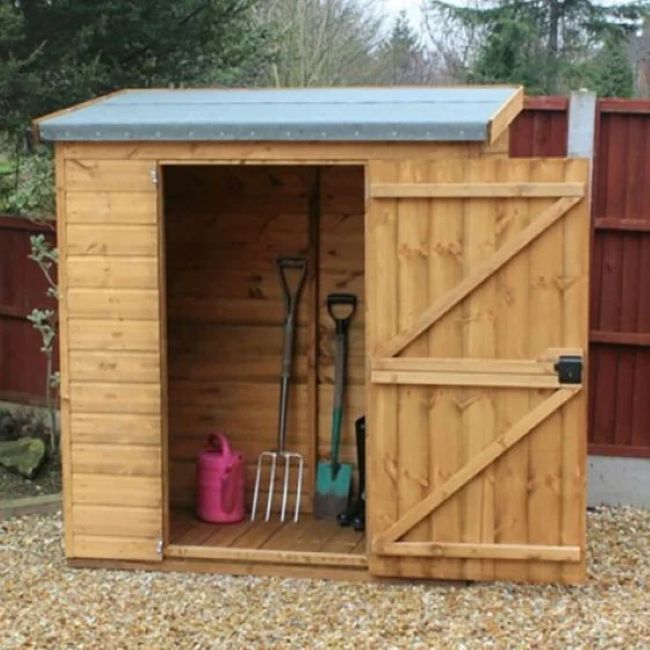
How to Choose a High-Quality Garden Shed
A garden shed is a valuable addition to any outdoor space, offering storage, workspace, or even a place to relax. However, with so many options available, picking the right one can feel overwhelming. Here’s a comprehensive guide to help you select a high-quality garden shed and ensure it stands on a strong, durable base.
Materials Matter: Understanding Shed Boarding Options
The type of boarding used to construct your shed greatly impacts its durability and appearance. Here are the most common options:
- Overlap Panels
- Description: These panels consist of horizontal wooden slats that overlap one another, creating a rustic look.
- Pros: Affordable and provides a traditional aesthetic.
- Cons: Less durable as the overlapping design can allow rainwater to seep through over time, leading to warping or rot if untreated.
- Best For: Budget-friendly options or sheds used for light storage.
- Tongue and Groove Panels
- Description: Each wooden slat interlocks with the next, forming a tight, seamless connection.
- Pros: Offers superior strength, weather resistance, and a polished appearance. The interlocking design keeps out rain and provides better insulation.
- Cons: Higher upfront cost.
- Best For: Long-term investments or sheds used frequently for storage, workshops, or hobby spaces.
- Shiplap Panels
- Description: Similar to tongue and groove but includes a small channel (or “groove”) for added water resistance.
- Pros: Combines the strength of tongue and groove with enhanced water runoff capabilities.
- Cons: Slightly more expensive than tongue and groove.
- Best For: Premium storage solutions in areas prone to heavy rainfall.
Other Factors to Consider
- Wood Treatment: Ensure the wood is pressure-treated to prevent rot and decay. Some sheds come pre-treated, while others require regular applications of wood preservative.
- Roof Type: Look for a roof style (e.g., apex or pent) that complements your garden’s design while offering adequate headroom and drainage.
- Flooring: Sheds often come with a basic floor, but opting for a reinforced base can provide added strength for heavier items.
Building a Solid Base for Your Shed
A sturdy base is essential to extend the lifespan of your shed and ensure its stability. Here’s how to prepare one:
- Choose the Right Location
- Select a flat, level area that is easily accessible and has good drainage.
- Avoid placing your shed directly on soil, as this can lead to moisture problems.
- Select a Base Type
- Concrete Slab:
- Pros: Durable, long-lasting, and provides a solid foundation.
- Cons: Requires more effort and cost to install.
- Best For: Large or heavy-duty sheds.
- Paving Slabs:
- Pros: Easier to install than concrete and still provides a stable base.
- Cons: Less durable over time compared to concrete.
- Best For: Medium-sized sheds or lighter usage.
- Timber Frame (Eco Base):
- Pros: Environmentally friendly and quick to assemble.
- Cons: May not be as durable as concrete or paving slabs.
- Best For: Small sheds or temporary installations.
- Concrete Slab:
- Prepare the Ground
- Remove grass, weeds, and debris from the area.
- Level the ground using a rake or spirit level.
- Add a layer of hardcore or gravel to improve drainage.
- Install the Base
- For concrete: Mix and pour concrete into a prepared frame and smooth the surface.
- For paving slabs: Lay the slabs on a bed of sand and cement, ensuring they are level.
- For a timber frame: Assemble the frame and secure it to the ground using stakes or anchors.
- Check for Levelness
- Use a spirit level to ensure the base is even before placing your shed on top.
Final Tips
- Assembly: If you’re not confident in DIY, consider hiring a professional to assemble your shed and base.
- Maintenance: Regularly inspect your shed for signs of wear, such as loose panels or rusted hinges, and address issues promptly.
- Security: Add locks or reinforcements to doors and windows to protect valuable items stored inside.
By choosing the right materials and constructing a solid base, you’ll enjoy a durable and attractive garden shed that meets your needs for years to come.
GardenAdvice recommended shed supplier https://www.shedstore.co.uk/





















